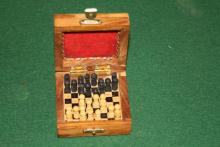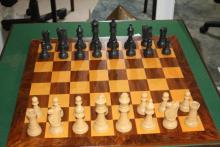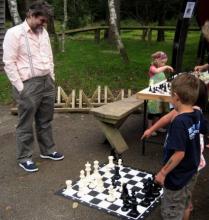There are many candidates for the title of 'the best chessplayer never to win the world championship'. I think I first heard Keres given that title, and he was the second-highest-rated player at some point (according to Jeff Sonas' ChessMetrics website http://www.chessmetrics.com ). Other second-highest-rated players include Chigorin, Zukertort, Blackburne, Nimzowitsch, Tarrasch, Schlechter, Najdorf and Ivanchuk. In fact, there are a number of players who were the highest-rated in Jeff's lists at some point but who never became World Champion: Pillsbury, Maroczy, Kolisch, Gunsberg, Janowsky, Rubinstein, Reshevsky, Bogoljubow... and Viktor Korchnoi. Korchnoi was primus inter pares for the last quarter of 1965, following a dominating tournament win http://chessmetrics.com/cm/CM2/PlayerProfile.asp?Params=199510SSSSSWS067... He competed strongly in Candidates' Matches in the 1967 cycle, but didn't qualify for a Championship match until 1978, when his actual rating was rather higher.
"I have heard so many times that Korchnoi had the great misfortune of meeting me when his best playing was already behind him. Nothing of the sort! Korchnoi's best years arrived exactly at the time he battled me" -- Anatoly Karpov
In the end, Korchnoi was a Candidate in 10 of the 11 cycles held between 1962 and 1991, and a Challenger in 1978 and 1981. His Candidates' Final match with Karpov in 1974 turned out to be a Championship match in effect, when Fischer could not agree terms to defend his title, and forfeited it.
Korchnoi's style is ... complex! He seems to make life as difficult for himself as his opponent, relishing the role of defender -- or rather, counter-attacker.
"I like to coax my opponents into attacking, to let them taste the joy of the initiative, so that they may get carried away, become careless, and sacrifice material"
For this reason, Korchnoi's style is also exciting, not to say nerve-wracking, to watch... Perhaps for these or other reasons, he was often in time trouble.
"It is a gross overstatement, but in chess, it can be said I play against my opponent over the board and against myself on the clock"
The drama and political intrigue of his life are every bit as rich and compelling as his chess, but here I will take a few moments from his battles over the board.
Opening
I've always liked this example of Korchnoi's play. His counter-attacking style seems ready-made for the Grunfeld, where White is invited to set up an 'ideal' centre, while Black has fluent development without weaknesses, and can strive to undermine it.
[Event "URS-ch21 Final"]
[Site "Kiev"]
[Date "1954.01.14"]
[Round "5"]
[White "Lilienthal, A."]
[Black "Korchnoi, Viktor"]
[Result "0-1"]
[ECO "D86"]
[Annotator "centre: hypermodern opening"]
[PlyCount "94"]
1. d4 Nf6 2. c4 g6 3. Nc3 d5 4. cxd5 Nxd5 5. e4 Nxc3 6. bxc3 Bg7 7. Bc4 O-O 8.
Ne2 Nc6 9. O-O Qd7 10. Ba3 (10. Be3) 10... Na5 11. Bd3 b6 {[#]} 12. Nf4 {?} Bb7
13. Qe2 Rfd8 14. Rad1 e6 15. e5 c5 {[#] White's proud centre is awfully
brittle.} 16. dxc5 (16. Be4 Qa4) (16. Bb1 Qc6 {Konstantinopolsky}) (16. Nh5
gxh5 17. Qxh5 h6 18. Bc1 Qd5 19. f3 (19. Qh3 cxd4) 19... cxd4 20. Bxh6 Qxe5)
16... Qc7 17. cxb6 Qxe5 18. Qxe5 Bxe5 19. Ne2 (19. Bb4 axb6 20. Nh3 Bd5 21.
Rfe1) 19... axb6 20. Bc1 Bd5 {[#] -+ White's centre has vanished, and Black is better. This position which shows that the
hypermodern idea is an idea only about the opening, not the importance of the
centre in the middlegame. Black is better here partly because he is better
centralised (the duff c3 pawn helps!)} 21. Bg5 f6 22. f4 fxg5 23. fxe5 Nc4 24.
Bxc4 Bxc4 25. Rxd8+ Rxd8 26. Re1 Rd2 27. Ng3 Rxa2 28. Ne4 Bd5 29. Nf6+ Kf7 30.
Nxd5 exd5 31. Rb1 Ra6 32. Rb5 Ke6 33. Kf2 Kxe5 34. Kf3 Ra3 35. Kg4 Rxc3 36.
Rxb6 Rc2 37. Kg3 d4 38. Rb7 d3 39. Rxh7 d2 40. Rd7 Ke4 41. Kg4 Rc4 42. Rxd2
Ke3+ 43. Kxg5 Kxd2 44. Kxg6 Ke3 45. h3 Kf4 46. g4 Rc5 47. Kh6 Rg5 0-1
Here's a quote about Korchnoi, rather than from him directly:
"Viktor Korchnoi was always saying: if you want to make progress, you have to learn new openings all the time. If such a person gives you such an advice, you should listen to it" Boris Gelfand
Korchnoi's annotations to this game made a strong impression on me: surely Grandmasters know everything, or at least, know everything that they play? The unknowable nature of chess that was revealed was somehow more alluring than the prospect of a knowable nature.
[Event "IBM"]
[Site "Amsterdam"]
[Date "1976.??.??"]
[Round "7"]
[White "Langeweg, Kick"]
[Black "Kortschnoj, Viktor"]
[Result "0-1"]
[ECO "A17"]
[WhiteElo "2450"]
[BlackElo "2670"]
[PlyCount "56"]
[EventDate "1976.07.??"]
{"Nearly five years ago I first started to use the opening system 1.c4 e5. This is quite a good system with which to reach an equal position, but when it had been analysed to death by other grand masters I became bored with it and adopted a different system using my own move order. The play has some delicate features which I myself don't fully understand."}
1. Nf3 Nf6 2. c4 e6 3. Nc3 Bb4 4. Qc2 O-O 5. a3 Bxc3 6. Qxc3 b6 7. g3 Bb7 8.
Bg2 d5 9. d4 dxc4 10. Qxc4 Bd5 11. Qc3 Nbd7 12. b4!? a5 13. b5?! c6 14. bxc6 Rc8
15. O-O Rxc6 16. Qe3 Qa8 17. Bd2 b5?! 18. Rfb1 Rb8 19. Ne1?! Bxg2 20. Nxg2 Ne4! 21.
Qd3 Rd6 22. Be3?! Ne5 23. Qc2? Rc8 24. Qb3 Nc4 25. Rc1 Rdc6 26. Qxb5 Nxa3 27. Qa4
Nc2 28. Rab1 Rc4 0-1
Middlegame
Korchnoi is the great sceptic of chess. He is never overly impressed with an opponent's attacking ideas, not even when they are conjured up by the magician from Riga. Korchnoi had a large plus score against Tal; here he wins as Black when Tal was at the height of his powers.
[Event "URS-ch26"] [Site "Tbilisi"] [Date "1959.??.??"] [Round "18"] [White "Tal, Mihail"] [Black "Kortschnoj, Viktor"] [Result "0-1"] [ECO "B94"] [PlyCount "120"] [EventDate "1959.01.09"] 1. e4 c5 2. Nf3 d6 3. d4 cxd4 4. Nxd4 Nf6 5. Nc3 a6 6. Bg5 Nbd7 7. Bc4 Qa5 8. Qd2 e6 9. O-O h6 10. Bh4 Be7 11. Rad1 Ne5 12. Bb3 g5 13. Bg3 Nh5 14. Ba4+ b5 15. Bxe5 dxe5 16. Nc6 Qc7 17. Nxe7 Kxe7 18. Bb3 Nf6 19. Qe3 Bb7 20. a4 b4 21. Na2 a5 22. c3 Ba6 23. Rfe1 bxc3 24. Rc1 Rab8 25. Rxc3 Qb6 26. Qxb6 Rxb6 27. Rc7+ Kd6 28. Ra7 Bb7 29. Bc4 Ra8 30. Rd1+ Ke7 31. Rxa8 Bxa8 32. Bb5 Bxe4 33. b4 axb4 34. Nxb4 Bb7 35. Nd3 e4 36. Ne5 Bd5 37. Rb1 Rb8 38. Rc1 Rb7 39. Kf1 Ne8 40. Rd1 Nc7 41. Be2 f6 42. Ng4 f5 43. Ne5 Rb2 44. Rc1 Ra2 45. Ng6+ Kd6 46. Nh8 e5 47. Rd1 Ke6 48. Bh5 Kf6 49. Bf7 Bxf7 50. Nxf7 Kxf7 51. Rd7+ Ke6 52. Rxc7 f4 53. Rc6+ Kd5 54. Rxh6 f3 55. gxf3 exf3 56. Ke1 Rxa4 57. Rb6 Ra1+ 58. Kd2 Rf1 59. Ke3 g4 60. Rb5+ Kc4 0-1
Korchnoi also has an awesome record with White against the King's Indian. Here is one example from hundreds: in his seventh decade, he plays blindfold in the very double-edged Mar del Plata variation. Black cannot do much about White's Queen's-side attack, but can instead start a dangerous attack against the white King.
[Event "Amber-blindfold 03rd"] [Site "Monte Carlo"] [Date "1994.??.??"] [Round "10"] [White "Kortschnoj, Viktor"] [Black "Polgar, Judit"] [Result "1-0"] [ECO "E98"] [WhiteElo "2615"] [BlackElo "2630"] [PlyCount "95"] 1. d4 Nf6 2. c4 g6 3. Nc3 Bg7 4. e4 d6 5. Be2 O-O 6. Nf3 e5 7. O-O Nc6 8. d5 Ne7 9. Ne1 Ne8 10. Be3 f5 11. f3 h5 12. c5 f4 13. Bf2 g5 14. a4 Rf6 15. a5 Rg6 16. cxd6 Nxd6 17. h3 Kh8 18. Nd3 Ng8 19. Nc5 Qe7 20. Ra3 Nh6 21. Nb5 g4 22. fxg4 hxg4 23. Nxd6 cxd6 24. Ne6 Bxe6 25. dxe6 f3 26. Bc4 fxg2 27. Kxg2 Rf8 28. h4 g3 29. Bxg3 Qxh4 30. Rxf8+ Bxf8 31. Bd5 Qg5 32. Rc3 Ng4 33. Qc1 Qe7 34. Rf3 Nf6 35. Qc8 b6 36. Kf1 Rg4 37. axb6 axb6 38. Bf2 Kg7 39. Bxb6 Kh7 40. Qd8 Rf4 41. Qxe7+ Bxe7 42. Rxf4 exf4 43. b4 Kg6 44. b5 Ng4 45. Bd4 f3 46. b6 Bh4 47. b7 f2 48. Ke2 1-0
And a fine example of Korchnoi's brave counter-attacking style, the first game in Simon Webb's Chess for Tigers
"A good illustration of how to play on your opponent's weaknesses is provided by the way Korchnoi tackled Geller in their semi-final match in the 1971 World Championship Candidates' series. He knew that he couldn't outplay Geller positionally (as he frankly admitted after the match); so he deliberately aimed for complicated and unclear positions, in which he believed Geller would be uncomfortable. This approach paid off handsomely. Geller continually became short of time trying to fathom the complications which Korchnoi produced, failed to find the right answers, and lost 5.5-2.5. Indeed he lost 3 of the 8 games on time. " -- Webb
[Event "Candidates qf2"]
[Site "Moscow"]
[Date "1971.??.??"]
[Round "8"]
[White "Geller, Efim P"]
[Black "Kortschnoj, Viktor"]
[Result "0-1"]
[ECO "B85"]
[WhiteElo "2630"]
[BlackElo "2660"]
[PlyCount "74"]
1. e4 c5 2. Nf3 d6 3. d4 cxd4 4. Nxd4 Nf6
5. Nc3 a6 6. Be2 e6 7. O-O Be7 8. f4 O-O 9. Kh1 Nc6 10. Be3 Qc7 11. a4 Bd7 12.
Nb3 b6 13. Bf3 Rfd8 14. Qe2 Be8 15. Bf2 Rdc8 16. Bg3 Nd7! 17. Rad1 Bf6 18. e5!
dxe5 19. fxe5 Be7 20. Nd4 Nxd4 21. Rxd4 Ra7 22. Rg4 h5! 23. Re4 g6 24. h3
(24.Bxh5!+-)
24...Bf8
25. Bh2 Bg7 26. Re3 Nc5 27. Qe1 Bc6 28. Bxc6 Qxc6 29. Qh4 Rd7 30. Ref3 b5 31.
axb5 axb5 32. b4 Nd3 33. Ne4 Qxc2 34. Nf6+ Bxf6 35. exf6 Rd5 36. Re3 Qc4 37.
Qg3 h4 0-1 {time}
Endgame
Nunn's awesome attacking talent and theoretical knowledge are tamed by accepting a small disadvantage in what looks like a technical endgame. Korchnoi does not intend to swap everything and draw, however, but increases the tension over the whole board, and White can't quite hold it together. A game quite in the style of Lasker -- whom both players admire.
[Event "WchT 1st"]
[Site "Luzern"]
[Date "1985.??.??"]
[Round "9"]
[White "Nunn, John DM"]
[Black "Kortschnoj, Viktor"]
[Result "0-1"]
[ECO "C11"]
[WhiteElo "2615"]
[BlackElo "2630"]
[PlyCount "68"]
[EventDate "1985.11.??"]
1. e4 e6 2. d4 d5 3. Nc3 Nf6 4. e5 Nfd7 5. f4 c5 6. Nf3 Nc6 7. Be3 cxd4 8. Nxd4
Bc5 9. Qd2 Bxd4 10. Bxd4 Nxd4 11. Qxd4 Qb6 12. Qxb6 Nxb6 13. O-O-O Bd7 14. Bd3
h5 15. Ne2 Ke7 16. Nd4 g6 17. g3 Bc6 {Recycling the Knight.} 18. Rde1 Nd7 19.
c3 Rag8 20. Rhf1 g5 21. f5 g4 22. Re2 h4 23. b4 hxg3 24. hxg3 Ba4 25. Kb2 Rh3
26. Rg1 Rgh8 27. Ka3 $1 Rc8 $5 (27... Nb6 28. b5 a6 29. bxa6 bxa6 30. Rb1 Bb5
31. Bxb5 axb5 32. Rxb5 Ra8+ 33. Kb4 $11) 28. Kb2 $15 {White blinks first.} (28.
Kxa4 $1 Rxc3 $1 {with mating threats which White can, however, survive. Not an
easy call, though!} 29. Bc2 Nb6+ (29... Rhxg3 30. Rxg3 Rxg3 31. Bb3 $14) 30.
Kb5 Ra3 31. Bb3 Nd7 32. Ba4 (32. Nc6+ $5) 32... Rhxg3) 28... a6 29. Rgg2 Bd1
30. Re3 Nb6 31. Rf2 Rh1 32. fxe6 fxe6 33. Rf1 Na4+ 34. Kc1 Rxc3+ 0-1
Lastly, a terrific win against Karpov. Neil McDonald has written about how he was perplexed by Korchnoi's choice of plan -- surely you are supposed to play the minority attack in such positions? But Korchnoi has other ideas.
[Event "World Championship 29th"] [Site "Baguio City"] [Date "1978.10.12"] [Round "31"] [White "Kortschnoj, Viktor"] [Black "Karpov, Anatoly"] [Result "1-0"] [ECO "D36"] [WhiteElo "2665"] [BlackElo "2725"] [PlyCount "141"] 1. c4 e6 2. Nc3 d5 3. d4 Nf6 4. cxd5 exd5 5. Bg5 Be7 6. e3 O-O 7. Bd3 Nbd7 8. Nf3 Re8 9. Qc2 c6 10. O-O Nf8 11. Bxf6 Bxf6 12. b4 Bg4 13. Nd2 Rc8 14. Bf5 Bxf5 15. Qxf5 Qd7 16. Qxd7 Nxd7 17. a4 Be7 18. Rfb1 Nf6 19. a5 a6 20. Na4 Bf8 21. Nc5 Re7 22. Kf1 Ne8 23. Ke2 Nd6 24. Kd3 Rce8 25. Re1 g6 26. Re2 f6 27. Rae1 Bh6 28. Ndb3 Bf8 29. Nd2 Bh6 30. h3 Kf7 31. g4 Bf8 32. f3 Rd8 33. Ndb3 Nb5 34. Rf1 Bh6 35. f4 Bf8 36. Nd2 Nd6 37. Rfe1 h6 38. Rf1 Rb8 39. Ra1 Rbe8 40. Rae1 Rb8 41. e4 dxe4+ 42. Ndxe4 Nb5 43. Nc3 Rxe2 44. Rxe2 Bxc5 45. bxc5 Rd8 46. Nxb5 axb5 47. f5 gxf5 48. gxf5 Rg8 49. Kc3 Re8 50. Rd2 Re4 51. Kb4 Ke8 52. a6 bxa6 53. Ka5 Kd7 54. Kb6 b4 55. d5 cxd5 56. Rxd5+ Kc8 57. Rd3 a5 58. Rg3 b3 59. Kc6 Kb8 60. Rxb3+ Ka7 61. Rb7+ Ka6 62. Rb6+ Ka7 63. Kb5 a4 64. Rxf6 Rf4 65. Rxh6 a3 66. Ra6+ Kb8 67. Rxa3 Rxf5 68. Rg3 Rf6 69. Rg8+ Kc7 70. Rg7+ Kc8 71. Rh7 1-0





























































